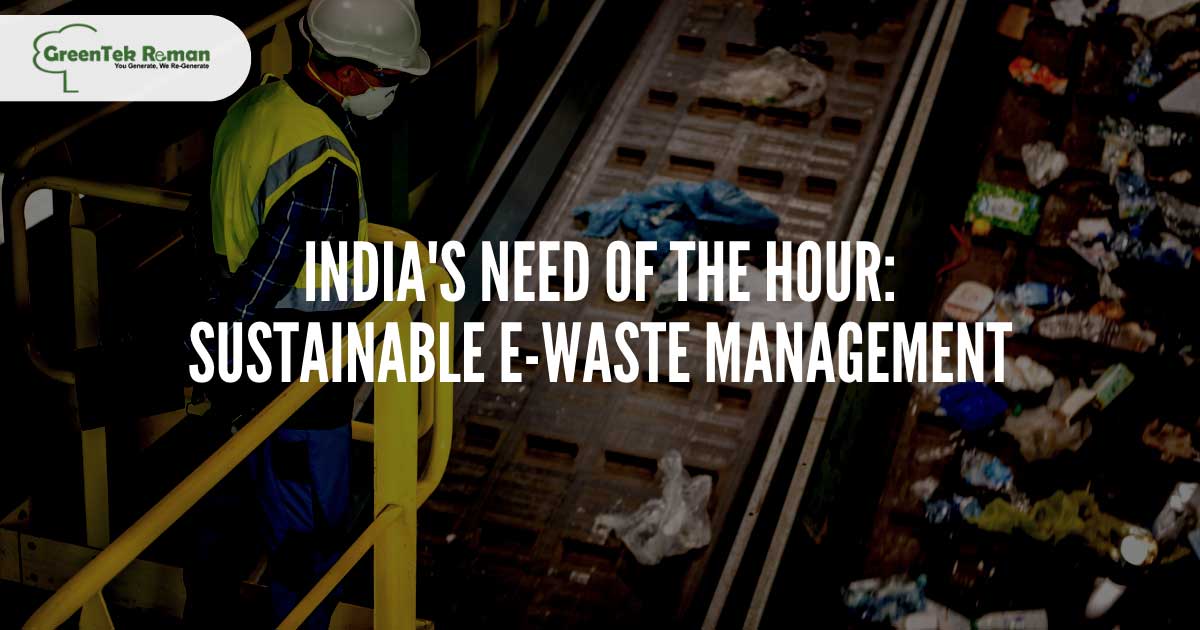The Urgent Need for E-Waste Management in India
The issue of e-waste management in India is becoming increasingly urgent as it poses severe health and environmental risks. The world has reached a digital age, where the use of electronic products has become commonplace. India has emerged as one of the world’s leading electronic goods markets. As a result, this transition has led to a significant increase in the amount of e-waste generated and disposed of each year, with India being one of the worst affected countries. Furthermore, this waste contains valuable resources that can be recovered and reused if appropriately managed.
E-waste management involves using best practices for collecting, recycling, and disposing of e-waste. It can help prevent electronic components from ending up in landfills or other hazardous sites. Further, this will help reduce air and water pollution caused by toxic chemicals released when these components are not disposed of properly.
Threats From E-waste in India
E-waste management in India is a growing global concern, but it is especially relevant in India. With the country’s population of over 1 billion and one of the world’s fastest-growing economies, India has increasingly relied on electronic devices for communication and entertainment. This dependency has led to a massive increase in e-waste, which poses significant threats to human health and the environment.
India currently generates 2 million tons of e-waste annually, ending in landfills or illegally burning or dumped into rivers and oceans. This waste contains hazardous materials such as lead, mercury, and cadmium, which can cause serious health problems when released into the environment. In addition to these toxic materials, e-waste also contains valuable resources that can be recycled into new products if appropriately handled.
The most significant threat of e-waste is its potential to pollute the air, water, and soil when not managed properly. Additionally, exposure to hazardous materials found in e-waste can be dangerous for human health.
Once these materials enter the environment, they can contaminate drinking water and cause various illnesses among people living nearby. Inadequate recycling and disposal practices can lead to several hazardous materials entering the environment. Toxic chemicals such as lead, mercury, cadmium, chromium, and polybrominated diphenyl ethers (PBDEs) are commonly found in e-waste items like computer monitors, cell phones, and batteries. When these materials enter the environment, they can cause air pollution, which affects nearby populations.
Government Initiatives in E-waste management in India
India’s government has taken several initiatives to address the issue of e-waste management across the country.
The Ministry of Environment and Forests (MoEF) has launched a project called ‘Gandhian E-Waste Management System.’ This initiative, taken up in the year 2021, is an effort towards building an environmentally sustainable India, which seeks to achieve effective e-waste management and raise awareness among citizens about the importance of responsible disposal. Under this project, ten major cities across India will have the infrastructure for collecting, transferring, and storing e-waste at designated sites. Additionally, the government has undertaken capacity-building activities such as training sessions on e-waste management to spread awareness of proper disposal methods.
Private Organization’s Role in E-waste Management in India
According to a report by the Central Pollution Control Board (CPCB), e-waste generation in India is estimated to reach 5.2 million metric tons by 2025. This amount can only be managed by the government efficiently with the help of private organizations, which can ensure proper collection and disposal procedures are followed. They also need to provide appropriate facilities for the safe storage and transportation of e-waste materials.
The role played by private organizations in managing India’s e-waste is critical for environmental sustainability. It works with e-waste by safely collecting, transporting, and disposing electronic equipment. By setting up robust waste management systems and recycling units, private organizations have an essential role in reducing hazardous waste from entering landfills or polluting water sources.
Private organizations are leading the way with innovative methods of recycling e-waste for reuse in the industry. By offering collection services for discarded electronics, these organizations can turn unwanted items into valuable resources that can be used again, Which helps to prevent harmful materials from being released into the environment and encourages more sustainable practices by avoiding further resource depletion.
Furthermore, these organizations are educating individuals and businesses about proper disposal techniques for e-waste products, increasing awareness among citizens about the need to conserve resources and protect our environment from harm so that hazardous materials do not end up in landfills or water bodies.
Conclusion
E-waste management in India is a critical issue facing the country today. The government and an increasing number of private organizations are taking on a role in managing this crisis, helping to red management & ITAD company and one of the top leading organizations that have been licensed by the State Pollution Control Board (SPCB), the Central Pollution Control Board (CPCB), and the Ministry of Environment, Forests, and Climate Change (MoEF), the Government of India. With us, you can be assured that your e-waste is being managed safely, legally, and environmentally sustainable.


